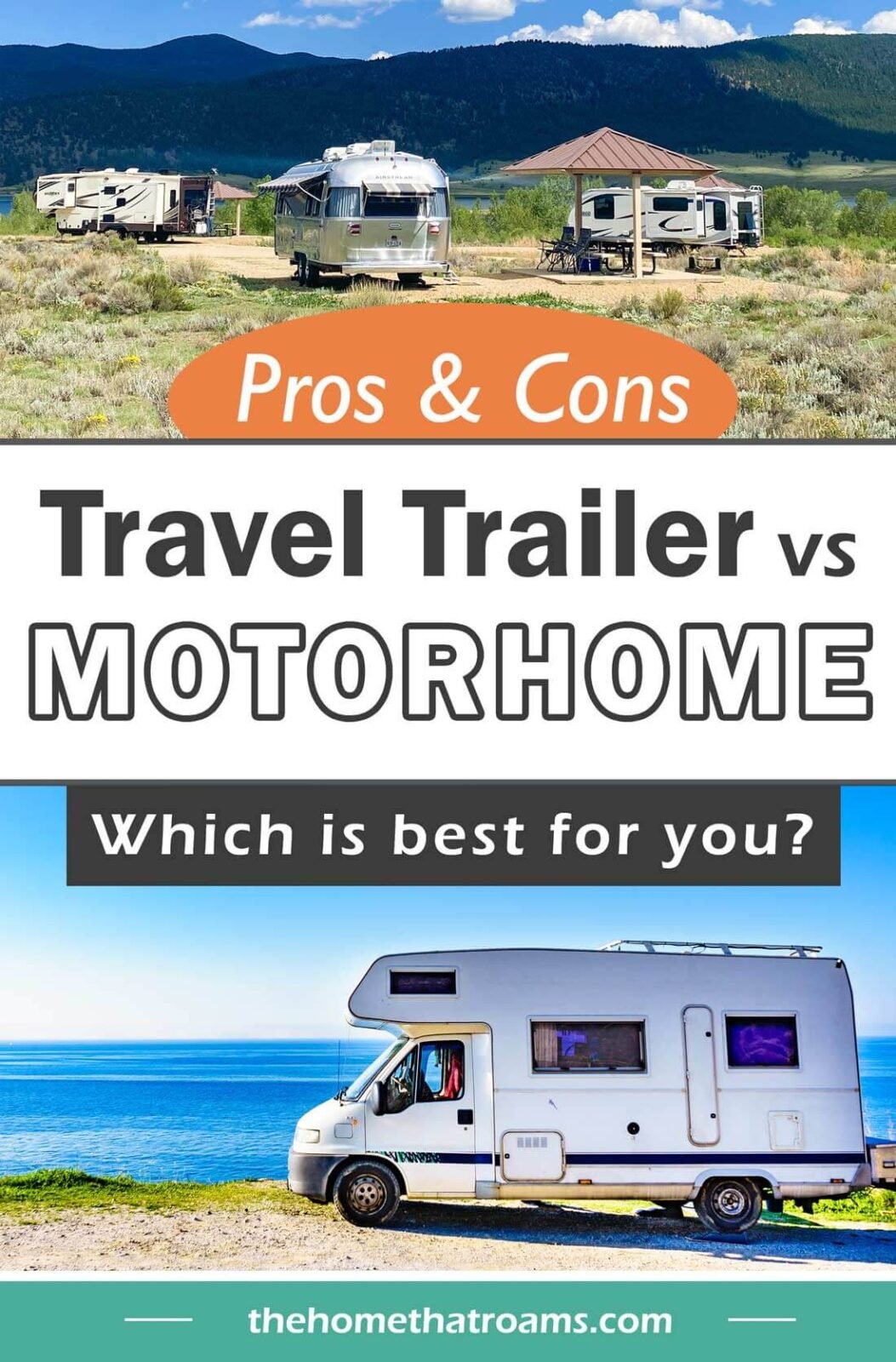Motorhome vs Travel Trailer: Which is Best for You?
As an Amazon Associate, we earn from qualifying purchases. We also earn from other affiliate websites. See our full disclaimer.
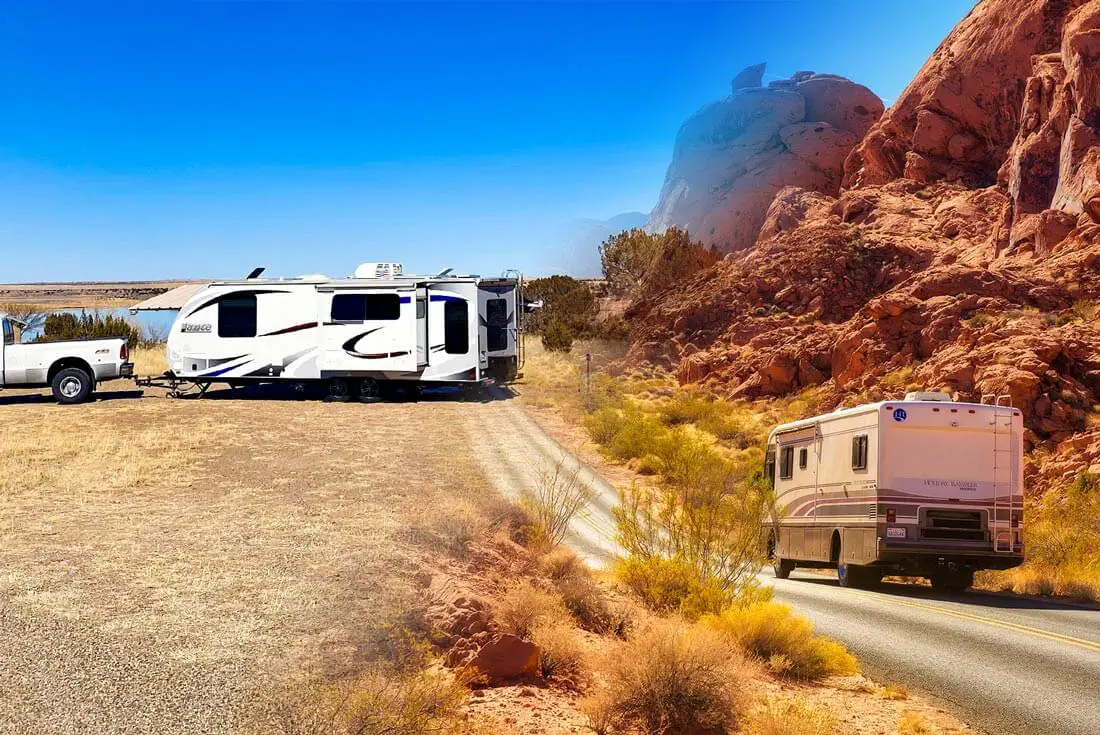
When planning your road trip or camping adventure, one of the biggest decisions you must make is what type of RV you want to travel in.
When it comes to motorhomes vs travel trailers, both have their pros and cons and their own unique features and benefits. What type of RV you choose depends on your camping needs and preferences.
Motorhomes are self-contained vehicles that come with all the amenities you need for comfortable travel, while travel trailers are towed behind your vehicle and offer more flexibility in terms of size and layout.
In this post, we’ll compare these different types of RVs and help you make an informed decision on a motorhome vs travel trailer.
What is an RV?
Before we get started, let’s clear up any questions you have about what an RV (recreational vehicle) is.
RV is a broad term used to describe a drivable or towable vehicle with a living area, kitchen, and/or other accommodations. This includes:
- class A motorhome (largest type of motorhome built on a bus chassis)
- class C motorhome (moderate-sized motorhome built on a cutaway van chassis)
- class B motorhome (small motorhome built on a van chassis)
- travel trailer or bumper pull RV (also includes teardrop trailers and popup campers)
- fifth wheel (requires a hitch that attaches inside the bed of the tow truck, due to this setup, they are much taller than travel trailers)
- toy hauler (these are usually fifth wheels, but travel trailer toy hauler models exist)
- truck camper (sits on the bed of a truck)
- camper van (converted van, whether professional build or DIY)
When we compare motorhomes and trailers below, we’ll also talk specifically about the types of RVs mentioned above.
For example, class As differ from class Cs in many ways since they are usually bigger and more costly to maintain. Fifth wheels also have other pros and cons. Although they aren’t travel trailers, they are a similar towable RV, so we’ll include them and mention them specifically.
Now that you know the different RV types, let’s get started!
1. RV Travel Days and Driving
One of the big differences between motorhomes and travel trailers is the driving experience. We’ll cover a few ways these RVs differ when they’re on the road.
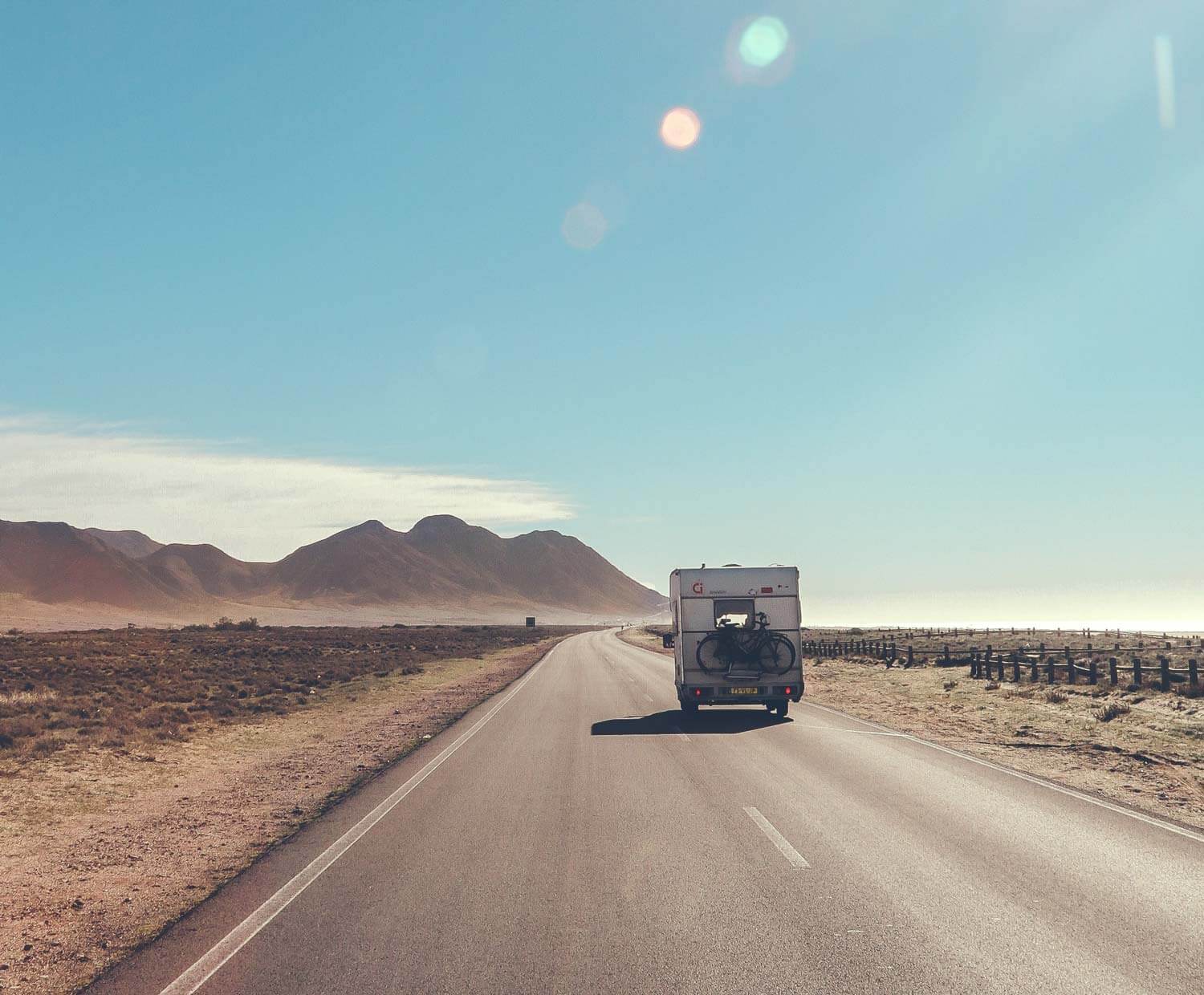
RV Length
The length of your RV is one of the greatest impacts on your driving experience. The longer your rig, the more concentration it takes to drive, and the more challenging it will be to maneuver.
A travel trailer setup will almost always be longer than a motorhome comparatively. However, a class A motorhome pulling a toad (second vehicle) and a shorter fifth wheel towed by a short bed truck may be relatively the same length once it is hooked up and on the road.
RV Width and Height
Smaller motorhomes are typically easier to drive, although they can be wider than most travel trailers. Class A and C motorhomes are usually at least 8 feet wide and, more often than not, they push the maximum width of 8.5-feet at 8.45-feet wide (talk about cutting it close).
Width and height will both impact your travel day and route planning. Both can be more difficult in a larger RV if you run into a low bridge or drive through a narrow downtown area.
The bigger the RV, the more you’ll have to plan your route carefully. Here are the average height of RVs by type.
- Fifth wheels have a much higher profile, as well as class A motorhomes (usually around 13 feet).
- Class C motorhomes are typically around 11-feet (including the AC on top).
- Travel trailers can vary, but on the lower end you can find profiles around 10-11 feet, and even as low as 9.5 feet (say hello to the compact design of an Airstream).
- Class B motorhomes are anywhere from 7-9 feet, with many of the high-end models bringing up the average.
Access
One of the big benefits you’ll hear from motorhome owners is the access you have while driving your RV. Whether you need to go to the bathroom, make a sandwich, get a refill on your drink, or grab your phone charger – these tasks are barely a thought in a motorhome (unless you’re traveling solo).
Having access to almost everything while driving also takes some of the stress out of the departure on travel days. You don’t need to remember every little thing before you get on the road – just grab it when you need it!
Visibility While Driving
Class A motorhomes have the advantage of visibility in the front of the RV due to the flat design of the windshield and many of the diesel engines being located in the rear of the RV.
However, these days there are many options for cameras in both motorhomes and trailers to see almost everything around you. Whether you’re backing your RV or driving it down the highway, you can keep an eye on all the angles.
Even if you have an older RV or vehicle for towing, you can add cameras for more visibility. For example, we tow our travel trailer with a 2003 F350. We added both a backup camera and a hitch camera to make driving the truck and hitching up a bit easier.
Backing Your RV
Overall, motorhomes are generally easy to back into a campsite since they are one vehicle and don’t have any pivot points like a trailer. Fifth wheels tend to be easier to maneuver due to the pivot point location in the bed of the truck as opposed to a bumper pull travel trailer. When turning a fifth-wheel trailer, this creates a longer and less dramatic response time.
Trailers are generally the hardest RVs to back. If you’re traveling with a partner, you’ll want to get your walkies out and practice before heading out on your first trip.
WINNER: From the access you have while driving to backing into your camping spot – we have to give this category to motorhomes for making travel days a little more enjoyable and convenient.
2. RV Campsite Setup and Breakdown
Another difference between these types of RVs to consider is the setup and breakdown of your campsite.
Motorhomes are typically much easier to set up than trailers. Sure, they both have the same hookups. Slideouts will also work very similarly in a motorhome as in a trailer. However, unhooking and stabilizing a trailer requires more time and effort than a comparable motorhome. (See our travel trailer setup checklist for more details.)
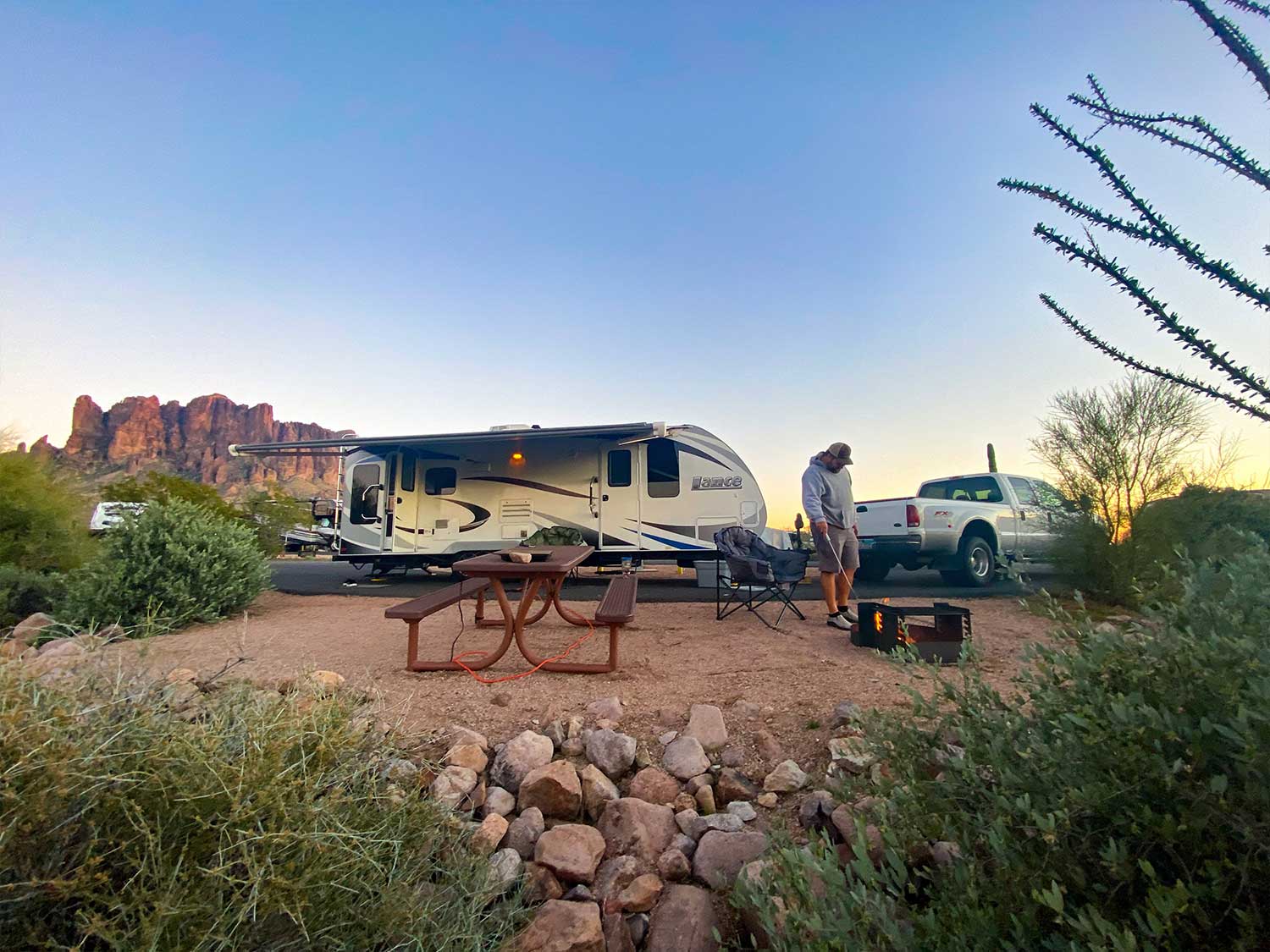
It’s also much easier to get going when you’re staying in the motorhome.
For example, when we had our class C, one of us could be driving the RV out of the campground while the other was still securing a few things, grabbing drinks, etc. In a towable RV, you need to have a checklist for everything you need in the tow vehicle and pack it all.
Also, suppose you forget to put something away, or a cabinet flies open. You’ll immediately be aware of this in a motorhome. In a towable, you have no idea what’s happening (or flying around) in the RV until you get to your next stop.
NOTE: If you have pets, motorhomes tend to make easier travel days. You avoid moving the animals back and forth, and they can find a comfy spot in the motorhome where they like to ride. It’s completely doable in a trailer. It just requires more planning and time for your pets to adjust. (See more about pet RV travel in our RVing with Cats post.)
WINNER: Many RVers say motorhomes are great for travel, and trailers are great for living. There’s definitely something to that, which is why motorhomes easily take this category!
3. Boondocking and Off-Grid Camping
Boondocking or camping without hookups is usually more associated with travel trailers, but motorhomes can be outfitted for boondocking too.
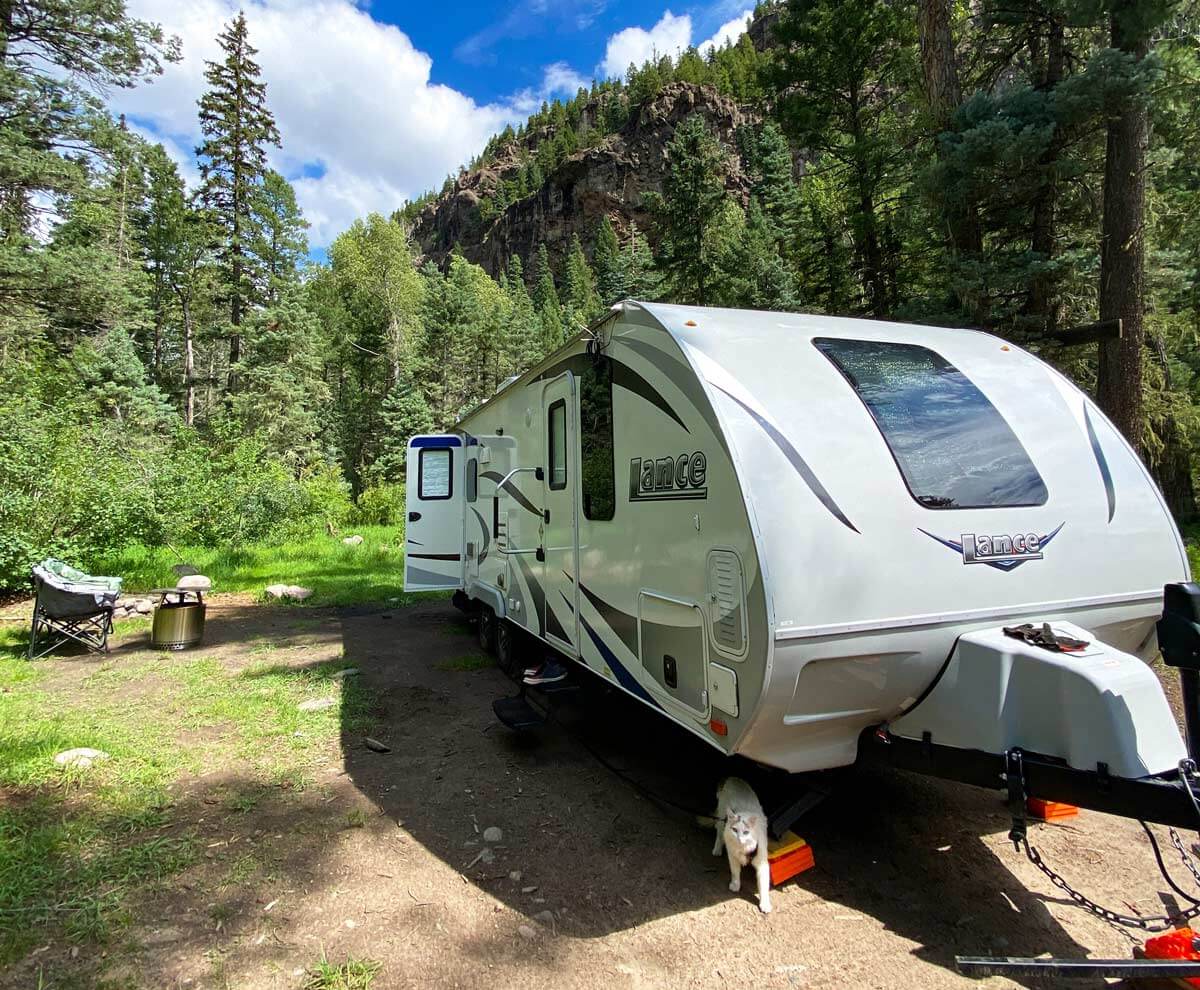
Most towable RVs (travel trailers, fifth wheels, etc.) will have a higher clearance needed to reach remote locations. In addition, the tow vehicle is more likely to have four-wheel drive.
Some class Bs are very well-suited for boondocking and unpaved roads, and even Class Cs can be modified to add higher clearance. Still, these are more the exception than the rule when looking at the majority of motorhomes on the market.
Suppose you tow your travel trailer with a truck. In that case, you’ll also have the truck bed for off-grid supplies like a water bladder (for additional freshwater) and a honey wagon (for pumping the black tank).
Still, there are boondocking locations with smooth roads that even class As can handle.
WINNER: This category goes to towable RVs for being the most boondocking-ready. Although it’s worth noting that some class Bs are built with off-grid excursions in mind.
4. RV Gas Mileage
Gas mileage on motorhomes versus trailers can vary greatly depending on the type of motorhome or the size of the trailer.
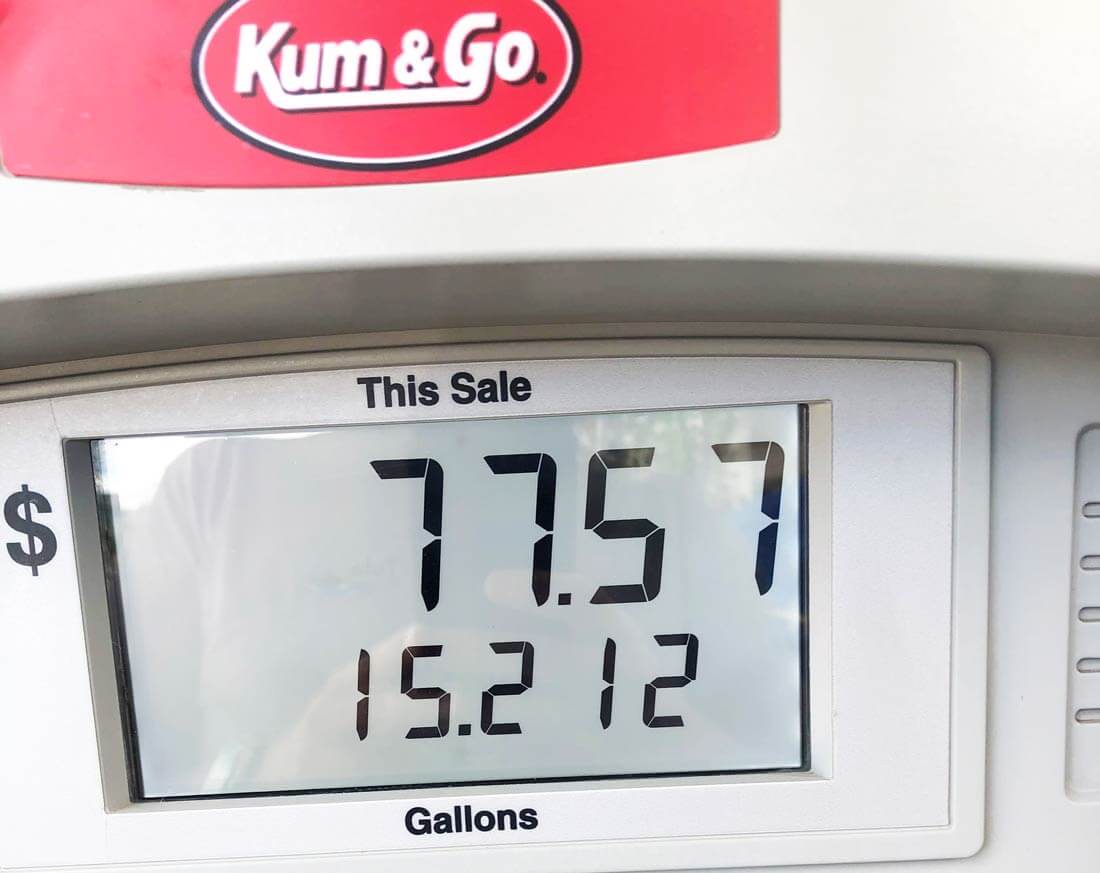
Class A motorhomes are almost always going to get low mileage (6-9 mpg). Class C models won’t do much better (10-12 mpg). Only class B models have better mileage due to their size.
With travel trailers and other RV towables, miles per gallon are determined by the size and weight of the trailer and the size and engine of your tow vehicle. This can vary greatly from under 10 mpg to around 14 mpg (although some owners report slightly better highway mileage).
With most motorhomes or RV towables, your mileage will range from 9-14 mpg. The exceptions are class B motorhomes, where you can get relatively good mileage (some up to 25 mpg), and class A motorhomes, where you’ll get even less than the range mentioned above.
Learn more about how to save on fuel for your RV.
WINNER: We couldn’t pick a clear winner for this category. There are just a few too many variables. However, the quick and dirty answer for getting the best gas mileage is to pack light and travel as tiny as possible!
5. Getting Around While RV Camping
One of the most significant advantages of travel trailers and RV towables is the benefit of having a separate vehicle. You unhook your truck or SUV and have a vehicle ready to transport you on adventures or errand runs.
If you have a smaller motorhome, you may be fine getting into parking areas. However, large motorhomes will be tough to drive around just anywhere. You will likely need a ‘toad’ (a vehicle you tow behind your motorhome) or, at the very least, bikes or e-bikes.
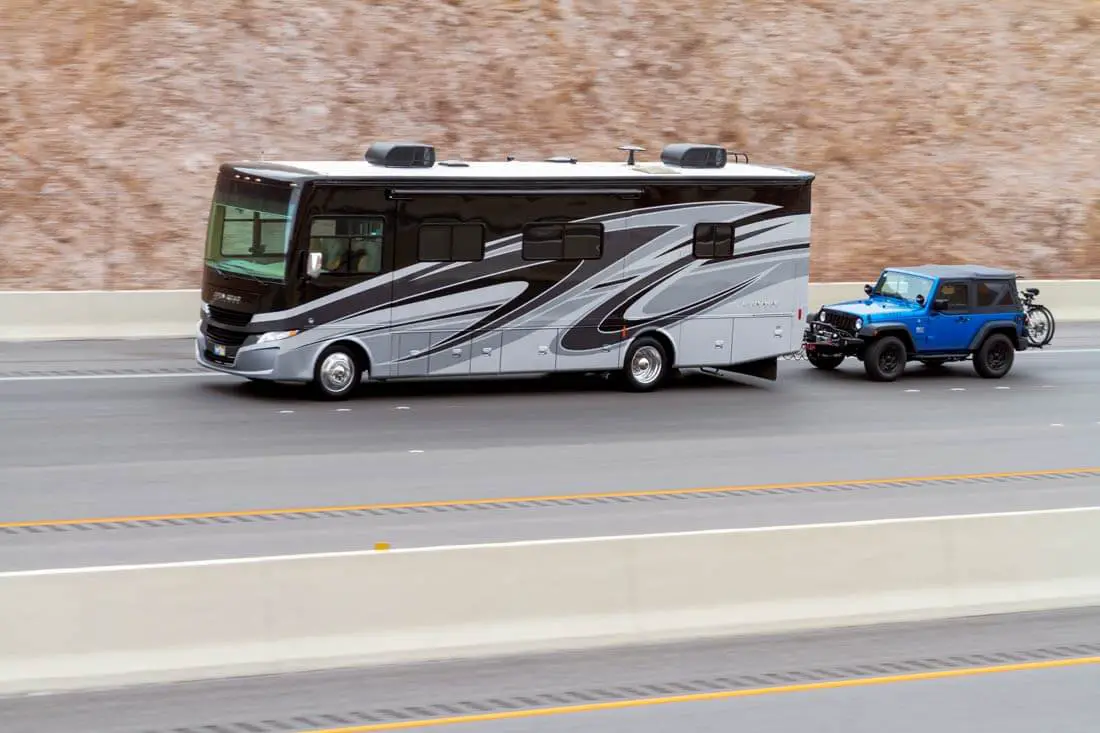
If you have pets, running errands in your motorhome might be more complicated with the furry ones in tow.
For example, we camped in Florida during the summer months in a class C without a toad, and it was challenging to go to the store. Someone had to stay in the motorhome with the cat to keep the AC running, or we had to make quick stops.
WINNER: Although you can get around without a separate vehicle by planning ahead, travel trailers and other towable RVs take this category since the process is much easier!
6. Living Space in the RV
Both motorhomes and travel trailers of similar size have comparable living spaces. Either RV type can also have slideouts which will increase the space. The differences come in with the height and layout of the RVs.
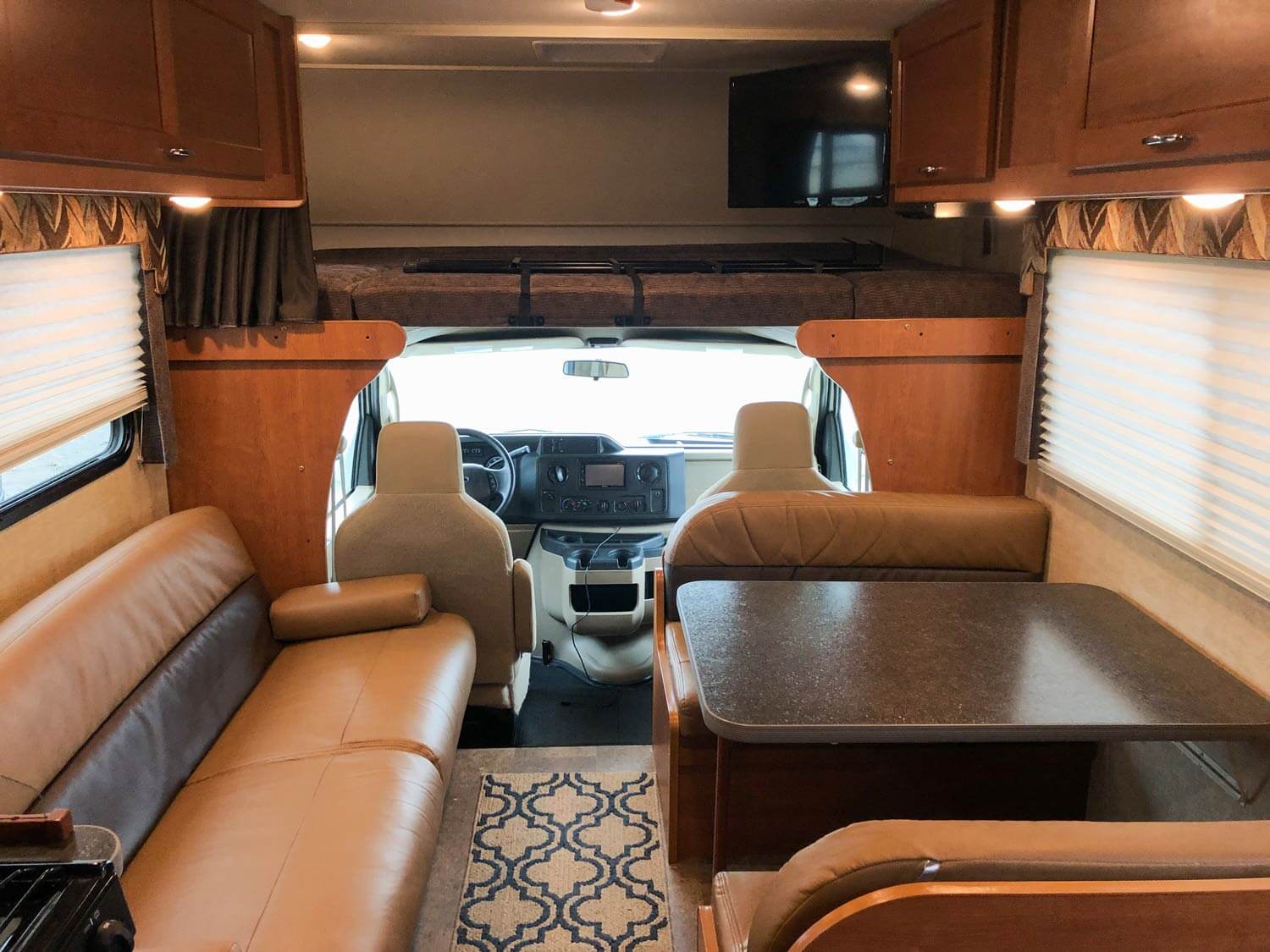
As mentioned above, class C motorhomes average a slightly higher profile than travel trailers, while class Bs are shorter and class As taller.
Motorhomes have less layout flexibility since the cab must be at the front of the vehicle. Because the cab is in the front of the motorhome, the bed almost always goes at the back (with the exception of some class B and small C RVs opting for a Murphy bed).
Travel trailer manufacturers typically place the bed in front of the trailer, leaving the rear open for kitchens, bunks, dinettes with wrap-around windows, and more appealing designs than you might get with a motorhome.
Cab Space in Motorhomes
Although the cab area in a motorhome can have a negative impact on the layout, it can also double as living space. This area is made multi-functional with swivel captain chairs and even foldable or swivel tables that come off the wall to create dining or desk space.
NOTE: When also comparing fifth-wheel trailers, these RVs and toy haulers maximize living space with both flexible layouts (including the mini garage of a toy hauler) and height with an average of approximately 13-feet.
WINNER: Although this is a close one, we have to give the living space category to travel trailers for the flexible layouts that allow RV owners to choose a living space that works for them.
7. Storage Space in the RV
Storage is a big consideration when you’re choosing an RV. Although this will vary by RV brand as well as the type, here is a general overview of storage space in drivable vs towable RVs.
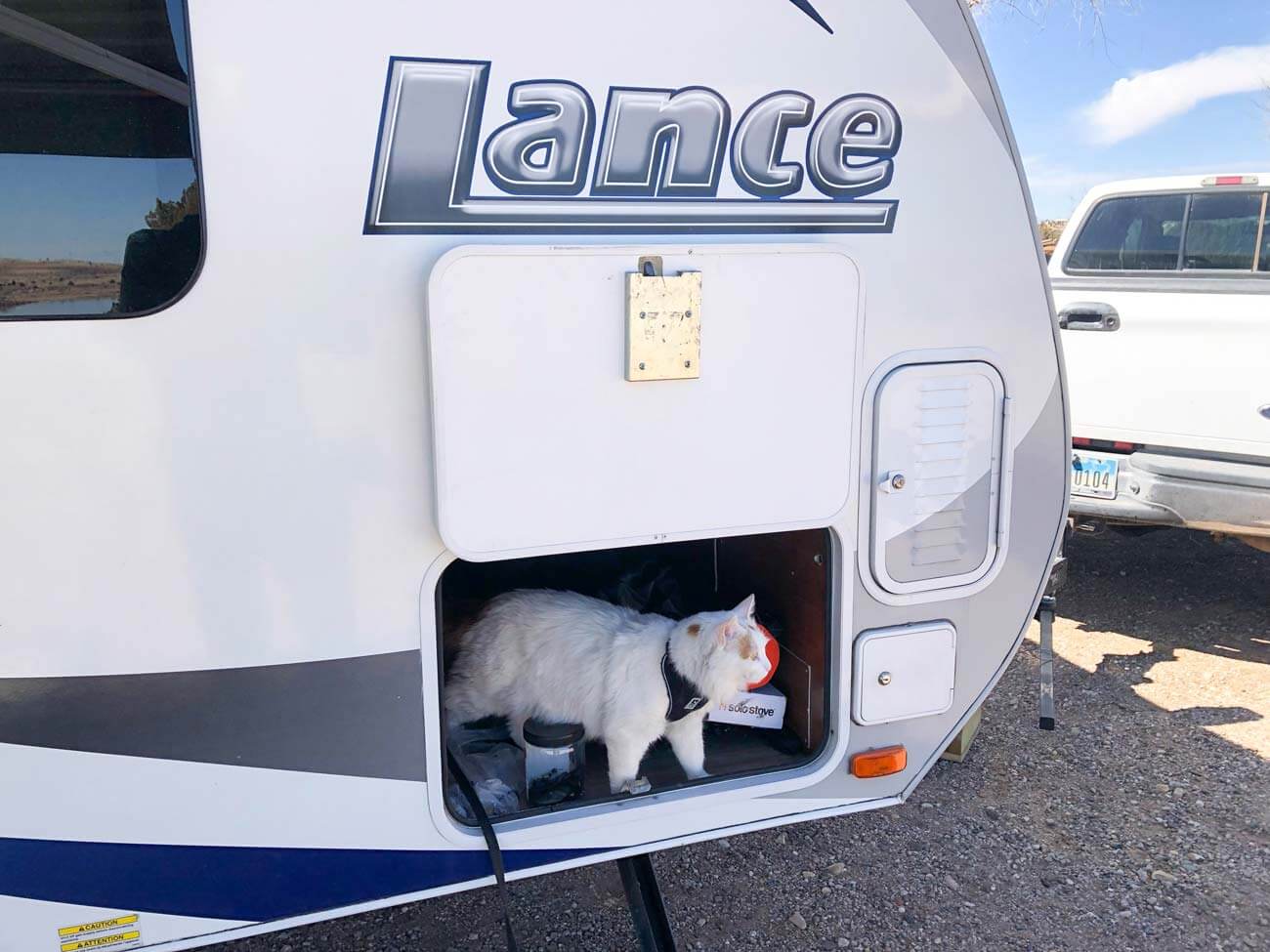
Exterior Storage
Motorhomes are known for having a lot of ‘basement storage’ or compartments under the motorhome – especially class A motorhomes. Pass-through storage compartments that can hold large storage bins, folding bikes, and even larger travel toys are benefits of the class A.
Class C motorhomes can have a good amount of basement storage as well – especially in the rear of the motorhome. Even if it’s not a true pass-through storage compartment, it might be accessible from one side of the vehicle in the rear.
Travel trailers generally have less exterior storage space (especially smaller trailers), although they have some exterior storage compartments. Some larger fifth-wheel exterior storage can rival that of a comparable class A motorhome.
Interior Storage
Class C motor homes can actually have a fair amount of interior storage space. They typically have an extra bunk over the cab (typically a queen size) that can be used as extra storage space. Class A motorhomes have ample storage space. Some even have cabinets that will fit a washer/dryer combo.
Don’t discount class Bs here. If you are looking for a smaller RV, class Bs are meticulously thought out to maximize storage in a tiny space. You’d be surprised what you can fit in these.
Travel trailers typically have less space than comparable size motorhomes. You’ll find more deep, narrow cabinets in travel trailers and ununiform cabinets that utilize every inch of available space.
For the most storage space in a trailer setup, check out a fifth-wheel RV that utilizes its tall ceilings to add more storage.
GVWR and Storage Space
When looking at storage space, consider the GVWR (gross vehicle weight rating) of your RV. Even though many RVs have storage space, you might be unable to use the space to its full extent if it puts your RV overweight. More times than not, weight becomes the issue before a lack of storage space.
NOTE: Class A diesel pushers tend to have a higher GVWR because the diesel engine allows for more weight. This goes for class B diesel models as well.
Utilizing a Truck Bed for Storage
A trick that helps give travel trailers extra storage is using the truck bed to store things. Adding a bed cover or camper shell to your truck bed can create a ‘garage’ for your RV that can fit a ton of stuff and (depending on your truck) a lot more weight. This is the main reason, as full-time RVers, we pull our lightweight trailer with a dually truck.
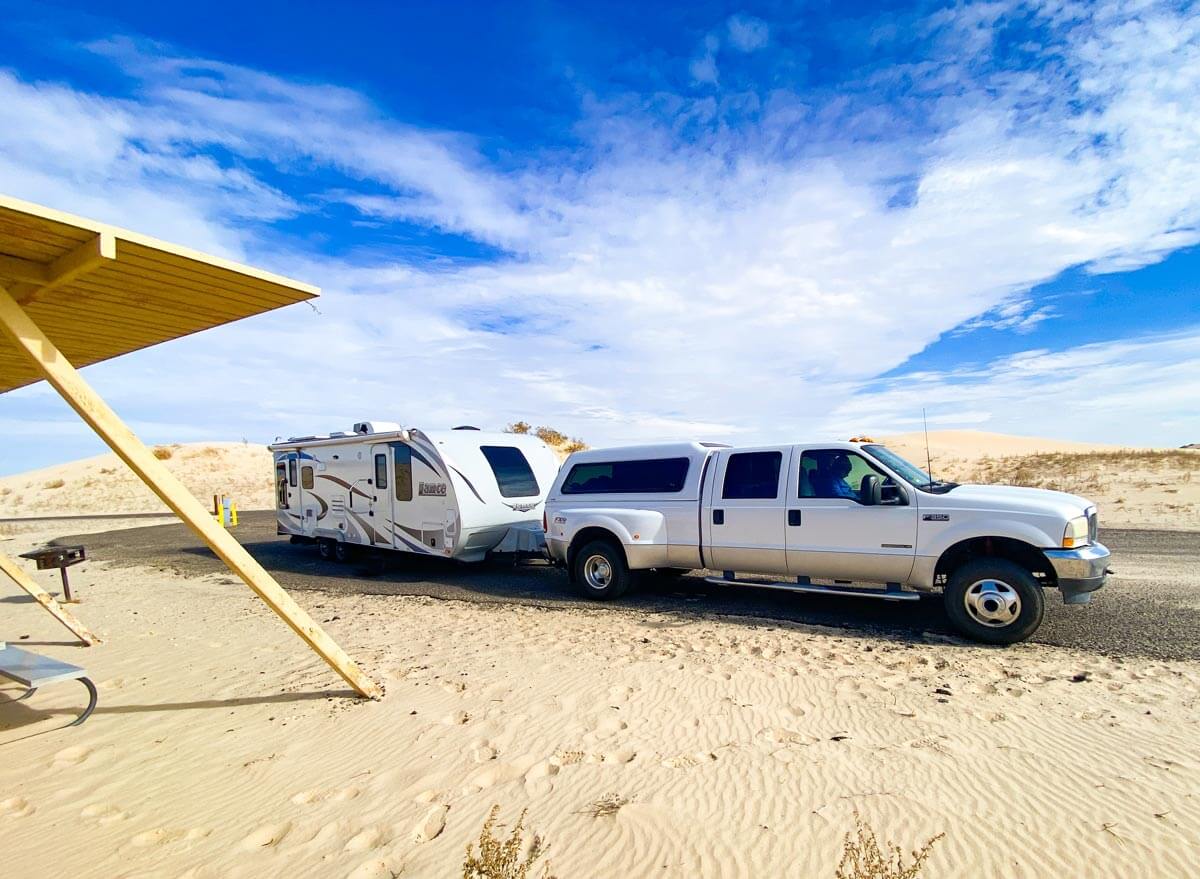
If you’re wondering about fifth-wheel owners, they aren’t out of luck either. Specific bed cover models can be rolled up or retracted and secured in the open position when the trailer is hooked up. Once at the campground and the trailer is unhooked, the bed cover can be closed. This adds additional space and security for storing outdoor gear at your campsite.
Again, be sure to check the GVWR of your truck before loading it down, and remember to factor in the tongue weight.
WINNER: Although you can add tow vehicle storage space when pulling a travel trailer, motorhomes have more storage right off the lot without modifications.
8. Cost of the RV
The price point for motorhomes is generally higher than comparable travel trailers since they have an engine. The benefit? You can live in a motorhome, AND it can take you anywhere.
However, a motorhome can be the cheaper RV option if you’re looking for an all-in-one solution and don’t already own a tow vehicle.

On the other hand, if you already have a vehicle capable of towing a trailer, a towable RV can be an affordable choice for your setup and will get you on the road quickly. This is why most RVers that aren’t full-time tend to have travel trailers or fifth wheels.
For more on RV living budgets and costs, check out our post on the real cost of RV living.
Motorhome vs Trailer Insurance Costs
RV insurance for motorhomes is typically more expensive than travel trailers since the cost of motorhomes is higher. However, with a trailer, you need to also insure your tow vehicle, which is something to consider.
You are only required to have insurance on a travel trailer if you are financing since the financer will require insurance. However, we do not recommend going with insurance since your auto insurance will only cover a specific amount of liability and only when the trailer is in motion.
For full-time RVers, full-timers insurance on either a motorhome or travel trailer is relatively comparable. We’ve owned a similar size motorhome and travel trailer and paid almost the same insurance plan cost annually for both.
We’ll cover maintenance costs in the next section.
WINNER: Travel trailers squeak out the cost category since they are typically the most affordable RV option, especially if you have a vehicle capable of towing.
9. RV Maintenance and Repairs
Motorhomes, like any vehicle, require regular maintenance and repairs. The larger the motorhome, the more expensive it will be to maintain.
Travel trailers also require regular maintenance, but since they don’t have engine upkeep like drivable RVs, they can be less costly to maintain.
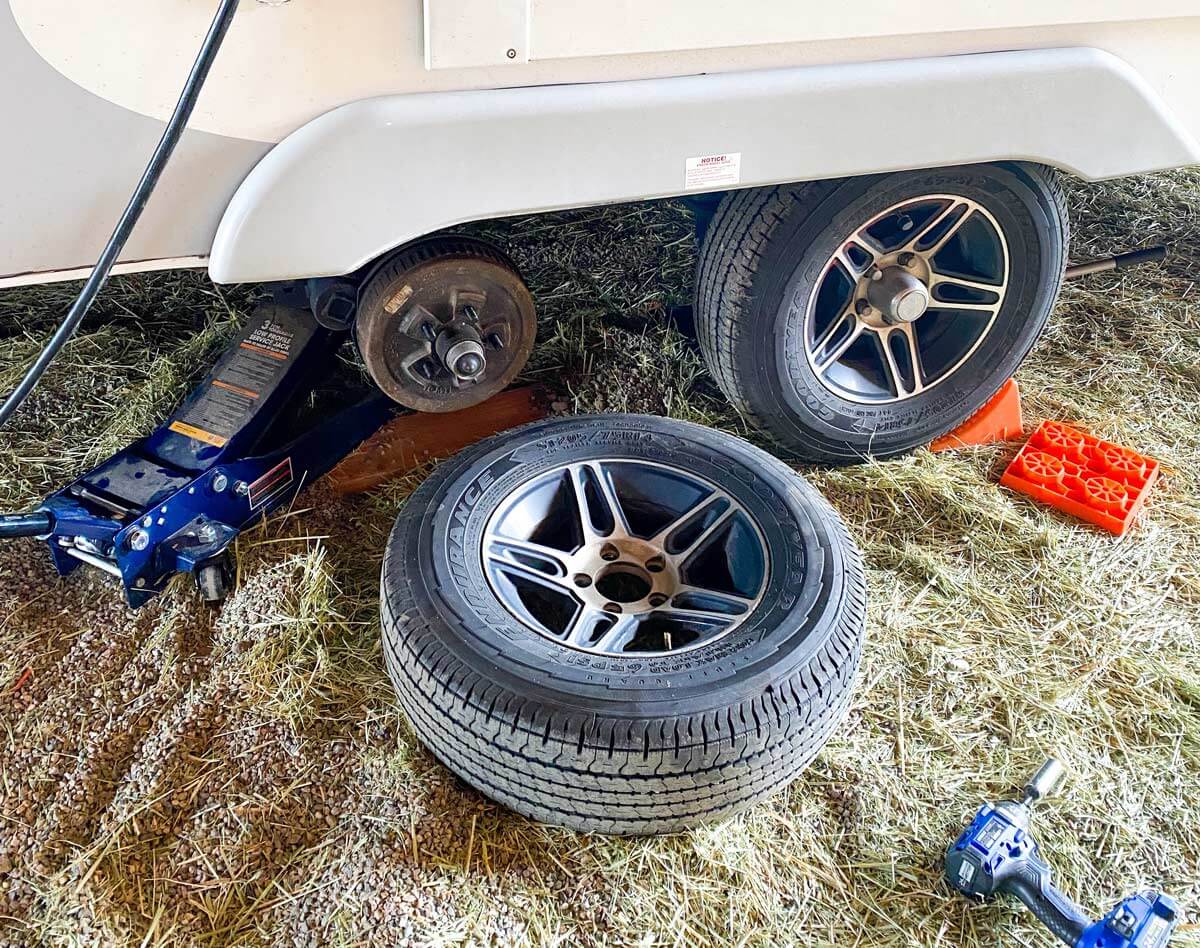
Large class A motorhomes have extra features such as air bag suspension systems and oversized tires that can be even more costly to repair and replace.
However, it’s crucial to be aware that motorhomes and travel trailers require regular maintenance to ensure their safety and longevity. Also, the more systems you have in your RV, regardless of whether it’s a motorhome or towable RV, the more it will cost to maintain those systems.
When considering the maintenance and repair costs of each option, factor in your own skill level and comfort with DIY repairs since being able to troubleshoot and perform maintenance on your RV can save you a lot of money.
NOTE: It is becoming increasingly difficult to find reliable people to repair RVs, and even harder to have repair work done in a timely manner.
WINNER: Ultimately, travel trailers come out on top for maintenance. Just remember, you might have a large truck or tow vehicle to maintain as well.
10. RV Depreciation
Just like any vehicle, motorhomes and travel trailers depreciate. Although all types of RVs lose roughly 20% of their value when driven off the lot, some RVs depreciate quicker in the first five years than others.
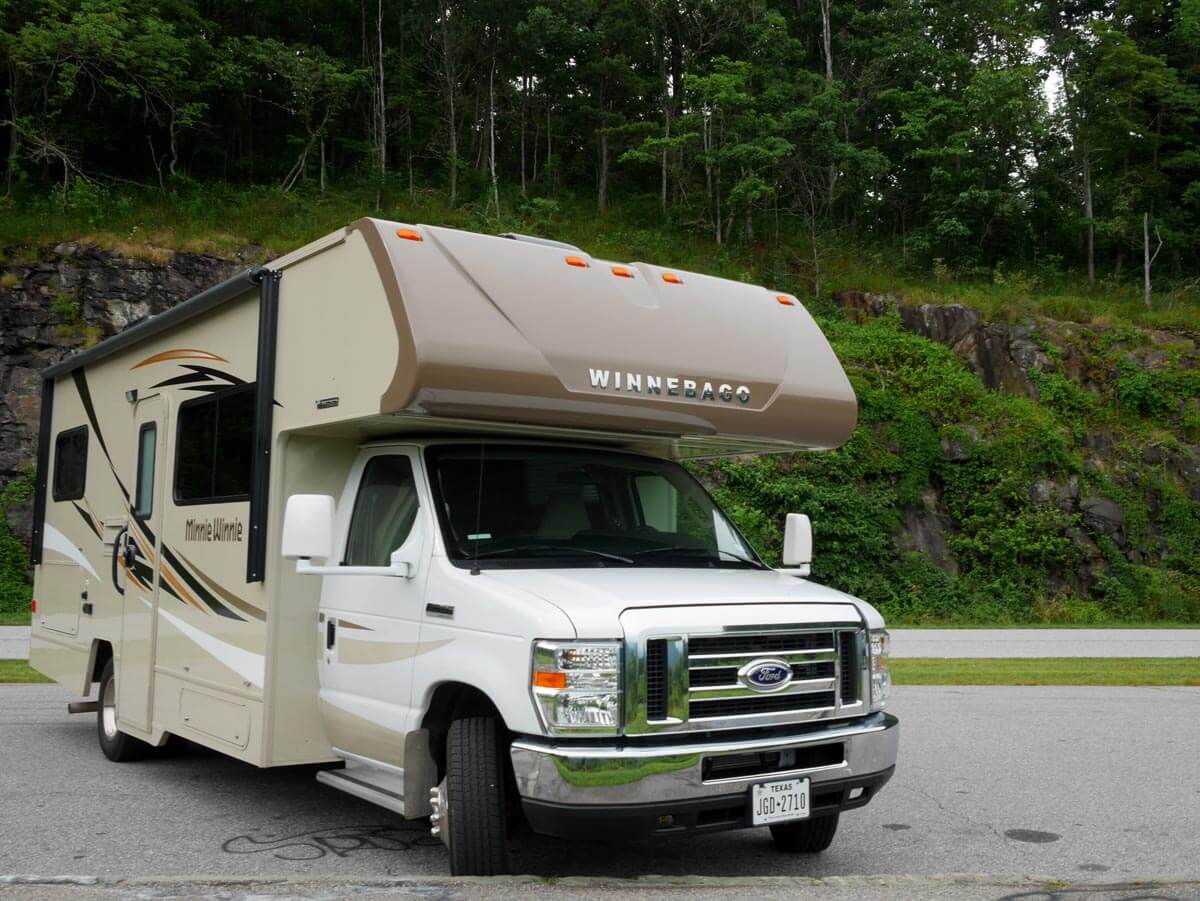
Class A motorhomes tend to depreciate quicker than class C motorhomes. These large RVs will also cost more upfront when buying a new motorhome. Class Bs don’t depreciate quite as fast as class As, and some brands will even hold their value well.
Class C motorhomes have the least amount of depreciation for drivable RVs because of their affordable price point, making them more in demand in the RV market.
Buying new versus used. It’s important to note that depreciation in the motorhome category is mostly dependent on the year rather than the mileage due to damage factors other than wear and tear on the engine.
On average, travel trailers typically depreciate about the same as class C motorhomes in the first five years (around 40%).
Fifth wheels depreciate a little quicker compared to travel trailers in the towable RV category, mostly due to their average size. The bigger the RV, the faster they depreciate.
Here are a few things to remember when it comes to depreciation:
- Motorhome depreciation is affected by the year and the mileage, but not just high mileage. Low mileage is also bad since it may have sat unused for a long time.
- Smaller quality RVs will depreciate less than larger ones. (This rule doesn’t apply to popup campers which depreciate rapidly.)
- Molded fiberglass travel trailers such as Oliver or Airstream will also hold their value, as well as quality truck campers.
- All depreciation points can vary depending on the specific make and model, as well as the overall condition and maintenance of the RV.
To find more information on RV depreciation, check out this detailed RV depreciation guide.
WINNER: Travel trailers claim the win for this last category since they have less depreciation after the first five years than motorhomes in general. However, this depends on the size and model in question, and it is about the same when compared to class Cs.
Which is Better – a Motorhome or Travel Trailer?
Even though travel trailers came out the winner in this comparison, you’ll still want to evaluate which RV is right for you.
We love our travel trailer, but because we like to move often we really miss the flexibility of our motorhome. Surprise – the best RV for you depends on your personal situation, needs, and preferences.
Whichever you choose, motorhome or travel trailer, make sure to do your research and ask lots of questions. You might also want to check out our article on the Best Motorhome Tips for Beginners.
By carefully weighing the pros and cons of each option and assessing your own needs, you can make an informed choice and enjoy the ultimate road trip or camping adventure!
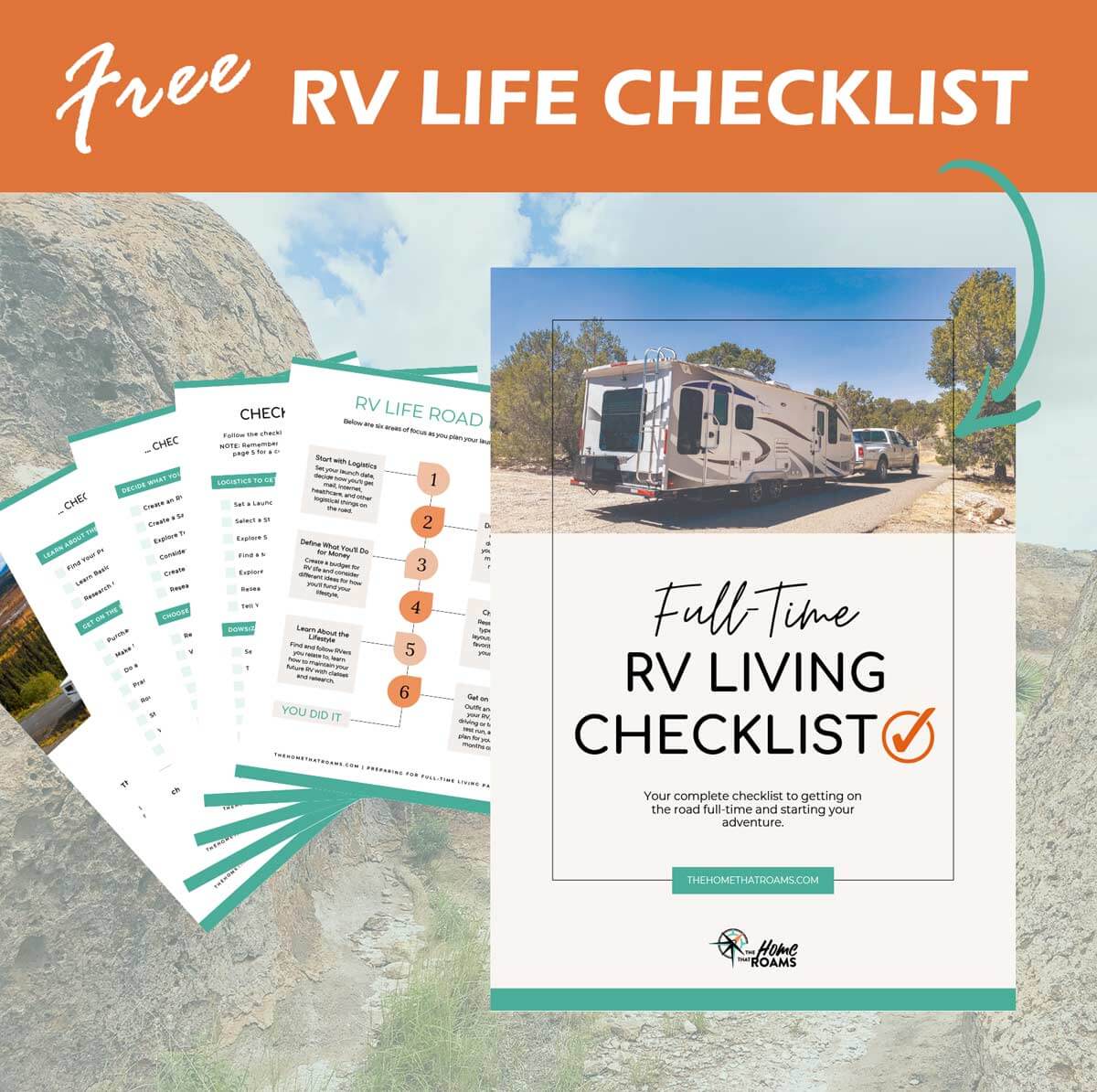
Your Guide to Launching RV Life
Road Map & Checklist – Start Now!
Unsubscribe at any time. View our privacy policy.
Want more beginner tips on how to choose an RV?
Check out our guide to preparing for full-time RV living, including info on choosing an RV, pros and cons of the lifestyle, RV gear, and more.
Like this post? Save it on Pinterest for later.
